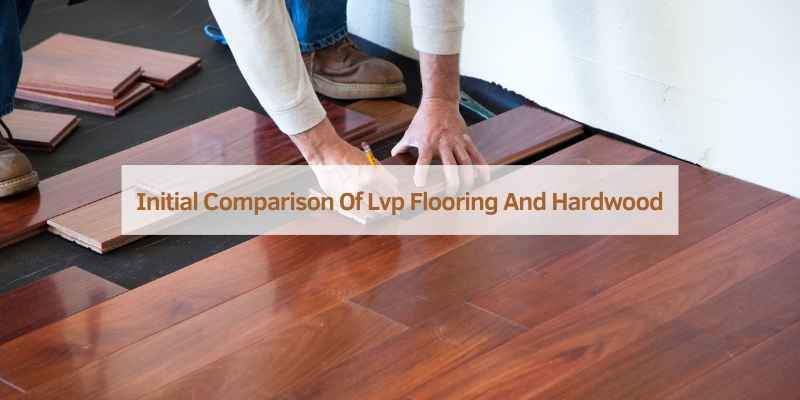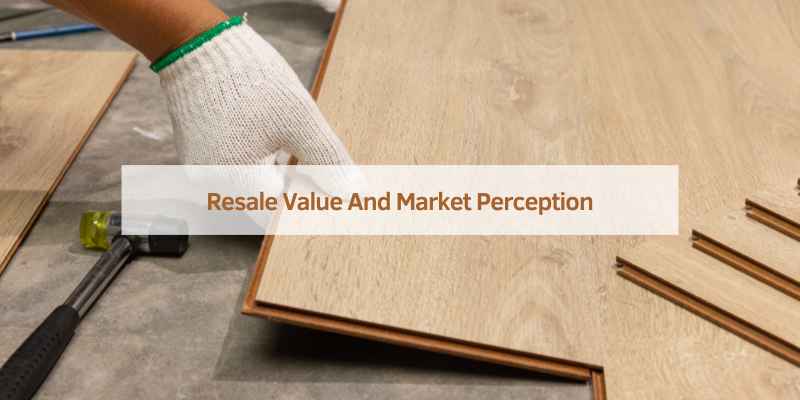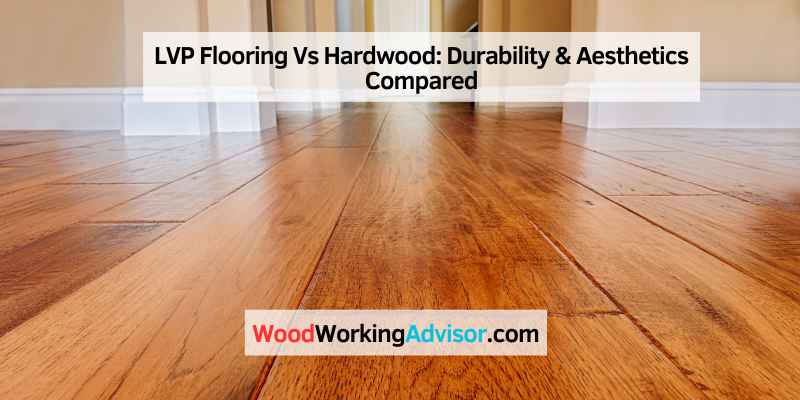Hardwood flooring has a longer lifespan and adds more value to a home, while LVP flooring is often less expensive upfront and has a favorable ROI. However, hardwood can be refinished multiple times and is more eco-friendly, while LVP is more durable and moisture-resistant.
Ultimately, the choice between LVP and hardwood flooring comes down to personal preferences, budget, and the specific needs of the space. Some people prefer the natural beauty and uniqueness of hardwood, while others appreciate the versatility and affordability of LVP.
It’s important to weigh the pros and cons of each option before making a decision.
Initial Comparison Of Lvp Flooring And Hardwood
Hardwood flooring has a longer lifespan and can add more value to a home, but it comes with a higher upfront cost. On the other hand, LVP flooring is less expensive and easier to maintain, but it has a shorter lifespan and may not add as much value to a home.
Ultimately, the choice between the two depends on personal preference and budget.
Material Composition And Appearance
LVP: Synthetic material mimics wood appearance.
Hardwood: Natural wood with unique grains and textures.
Pricing And Value Proposition
LVP: Generally more affordable upfront cost.
Hardwood: Higher initial investment with long-term value.

Breaking Down Durability
When it comes to choosing between LVP flooring and hardwood, one of the key factors to consider is durability. Both options have their own strengths and weaknesses in terms of scratch and dent resistance, lifespan, and maintenance requirements. Let’s break it down further:
Scratch And Dent Resistance
Hardwood flooring is known for its natural beauty and timeless appeal. However, it is more prone to scratches and dents compared to LVP flooring. The solid surface of hardwood can be easily damaged by heavy furniture, pet claws, or accidental impacts. On the other hand, LVP flooring is designed to be highly resistant to scratches and dents. Its protective wear layer provides a strong barrier against everyday wear and tear, making it an ideal choice for high-traffic areas or homes with active families.
Lifespan And Maintenance Requirements
When it comes to lifespan, hardwood flooring has the advantage. With proper care and maintenance, hardwood floors can last for decades and even centuries. They can be refinished multiple times, allowing you to restore their original beauty and extend their lifespan. On the other hand, LVP flooring has a relatively shorter lifespan compared to hardwood. However, LVP floors are relatively low maintenance. They are resistant to stains and moisture, making them easy to clean and maintain. Regular sweeping and occasional mopping are usually enough to keep LVP floors looking their best.
In conclusion, when it comes to durability, LVP flooring has the upper hand in terms of scratch and dent resistance. However, hardwood flooring surpasses LVP in terms of lifespan and the ability to be refinished. Ultimately, the choice between LVP and hardwood depends on your specific needs, budget, and aesthetic preferences.
Aesthetics And Design Flexibility
When it comes to choosing between LVP flooring and hardwood, considering aesthetics and design flexibility is crucial. Both options offer distinct visual appeal and the ability to enhance the overall look of a space. Let’s explore the natural beauty and variation of hardwood as well as the design innovations in LVP.
Natural Beauty And Variation Of Hardwood
Hardwood flooring exudes a timeless charm with its natural beauty and unique variations. Each plank showcases the authentic grain patterns, knots, and color variations, adding character and warmth to any room. The organic feel of hardwood creates a sense of luxury and sophistication that is unmatched by other flooring options.
Design Innovations In Lvp
LVP, on the other hand, offers a wide range of design innovations that cater to diverse aesthetic preferences. With advanced printing and embossing technologies, LVP can accurately mimic the look and feel of various natural materials, including hardwood, stone, and tile. This versatility allows for endless design possibilities, making it easier to achieve the desired aesthetic in any space.
Installation Process And Time
When it comes to the installation process and time, LVP flooring is quicker to install compared to hardwood. With its click-and-lock installation system, LVP can be installed faster, making it a convenient choice for homeowners. Additionally, LVP can be installed over existing flooring, saving time and effort.
Ease Of Lvp Installation
Installing LVP flooring is simple and straightforward.
- Click-and-lock system for easy installation
- No need for glue or nails
- Can be installed over existing flooring
Complexities In Hardwood Flooring Installation
Hardwood flooring installation can be more intricate.
- Requires subfloor preparation
- Potential for sanding and finishing
- Professional installation may be necessary
Environmental Impact And Sustainability
When it comes to choosing between LVP flooring and hardwood, considering the environmental impact and sustainability is crucial. Both options have their own set of advantages and disadvantages in terms of eco-friendliness and recyclability.
Eco-friendliness Of Hardwood
Hardwood flooring is considered more eco-friendly compared to LVP due to its natural sourcing. When harvested responsibly, hardwood is a renewable resource that promotes sustainable forestry practices. Additionally, hardwood floors can last for generations, reducing the need for frequent replacements and minimizing environmental impact.
Lvp And The Question Of Recyclability
Luxury vinyl plank (LVP), on the other hand, presents challenges in terms of recyclability. While some advancements have been made in recycling LVP, it is generally considered less environmentally friendly due to its synthetic composition and difficulty in recycling. Proper disposal and management of LVP waste are essential to minimize its environmental impact.
Resale Value And Market Perception
Enhance your home’s resale value by choosing hardwood over LVP flooring. Hardwood’s timeless appeal attracts buyers, offering a better ROI and commanding higher sale prices. Opt for hardwood to make a long-lasting investment with the ability to refinish and maintain its appearance.
Hardwood’s Impact On Property Value
When it comes to resale value, hardwood flooring has always been a popular choice among homeowners and homebuyers. Hardwood floors are often seen as a luxury item, which can make your property more desirable to potential buyers. In fact, a study conducted by the National Wood Flooring Association found that 99% of real estate agents surveyed agreed that homes with hardwood floors are easier to sell, and 82% said that homes with hardwood floors sell for more money.
Lvp’s Growing Acceptance In Real Estate
While hardwood flooring has long been the standard for luxury flooring, luxury vinyl plank (LVP) flooring has been growing in popularity in recent years. LVP flooring is often less expensive than hardwood, making it a more affordable option for homeowners. Additionally, LVP flooring is durable and easy to maintain, which can make it attractive to potential buyers.
In today’s real estate market, both hardwood and LVP flooring can be seen as valuable assets to your property. While hardwood flooring may add more value to your home and have a longer lifespan, LVP flooring offers a more affordable initial investment with a favorable ROI. Ultimately, the decision between hardwood and LVP flooring comes down to personal preference and budget.
In conclusion, whether you choose hardwood or LVP flooring for your home, both options can add value to your property. Hardwood flooring has long been the standard for luxury flooring and can command a higher sale price, while LVP flooring offers a more affordable option with growing acceptance in the real estate market.

Care And Repair: Long-term Considerations
When considering long-term care and repair options for LVP flooring and hardwood, it’s essential to weigh the maintenance and durability of each. While hardwood floors have the potential for refinishing, luxury vinyl plank (LVP) offers a convenient solution for replacing damaged sections.
Refinishing Potential Of Hardwood
Hardwood floors have the advantage of being able to be refinished multiple times, allowing homeowners to restore their appearance and extend their lifespan. This process involves sanding down the surface to remove scratches, stains, and wear, then applying a new finish to protect and revitalize the wood. With proper care and maintenance, hardwood floors can maintain their beauty and functionality for decades, making them a valuable long-term investment.
Replacing Damaged Sections Of Lvp
LVP flooring offers a practical solution for addressing localized damage. In the event of scratches, dents, or other issues affecting specific areas, individual planks can be replaced without the need for extensive refinishing or reinstallation. This targeted approach to repair allows for cost-effective maintenance and preserves the overall aesthetic appeal of the flooring.
Final Verdict: Balancing Cost And Quality
When it comes to choosing between LVP flooring and hardwood, it’s essential to strike a balance between cost and quality. Both options have their unique benefits and drawbacks, making it crucial to evaluate the short-term and long-term implications of your decision.
Short-term Vs Long-term Investment
Initially, LVP flooring presents a more affordable investment compared to hardwood. Its installation costs are lower, and the material itself is budget-friendly. However, when considering the long-term outlook, hardwood emerges as the more durable and sustainable choice. With proper maintenance and occasional refinishing, hardwood floors can last for decades, adding significant value to your home.
Making The Choice For Your Home
Ultimately, the decision between LVP flooring and hardwood depends on your specific needs and priorities. If you prioritize immediate cost savings and require a flooring option that can withstand high moisture areas, LVP may be the suitable choice. On the other hand, if you seek timeless elegance, long-term durability, and a potential boost in property value, investing in hardwood flooring could be the ideal solution for your home.
Frequently Asked Questions
Is Hardwood Better Than Lvp?
Hardwood flooring offers more value and longevity, making it a cost-effective choice in the long run. It can be refinished multiple times and adds more value to a home.
What Are The Disadvantages Of Luxury Vinyl Plank Flooring?
Disadvantages of luxury vinyl plank flooring include inability to be repaired, potential emission of volatile organic compounds, shorter lifespan compared to wood floors, difficulty in removal (especially if adhesive is used during installation), and lack of eco-friendliness and recycling challenges.
Is Hardwood Or Lvp Better For Resale?
Hardwood floors are better for resale as they add value to a home and have a longer lifespan compared to LVP, making them a more cost-effective choice in the long run.
Does Luxury Vinyl Plank Devalue A Home?
Luxury vinyl plank (LVP) flooring may not increase the value of a home like hardwood or tile would. While LVP is affordable and versatile, it may not have the same resale value. Hardwood flooring, on the other hand, can attract more buyers and potentially command a higher sale price due to its timeless appeal and longer lifespan.
Additionally, hardwood can be refinished multiple times, extending its life and maintaining its appearance.
Conclusion
Ultimately, the choice between LVP flooring and hardwood depends on your budget, aesthetic preferences, and long-term goals. While LVP offers affordability and versatility, hardwood adds timeless value and durability. Consider the resale value, maintenance, and overall impact on your home before making a decision.


